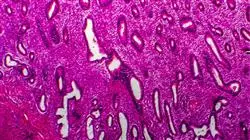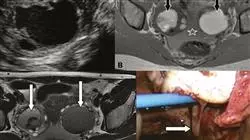University certificate
Accreditation/Membership
The world's largest faculty of medicine”
Introduction to the Program
A program created to guide professionals through the essential knowledge in Endometriosis, which they will then be able to apply in their daily practice”

This high quality program will cover the protocols used daily in Endometriosis Units through hands-on teaching.
Students will have the opportunity to learn how to use and interpret both new technologies and the most current genetic tests in the early diagnosis of Endometriosis.
Different perspectives of both surgical and medical treatments will be provided, as well as all the necessary information for correct monitoring and prevention of complications.
In the same way, a combined perspective on concomitant diseases, such as autoimmune diseases or sterility, will be addressed.
This program is designed to help professionals treat Endometriosis patients more effectively, and provide effective education on the mechanisms of diagnosis, treatment and management of Endometriosis through practical and theoretical teaching provided by leading professors.
Through the knowledge and understanding gained, the student will be capable of working independently in the comprehensive assessment of Endometriosis, as well as being able to make decisions about its evolutionary course. Furthermore, in turn, they will be able to move on to become a certified Endometriosis specialist.
For all these reasons, TECH has designed this Master's Degree, which will provide the professional with specialized knowledge that will help them develop a comprehensive approach to their patients from a multidisciplinary point of view, all thanks to the content developed by physicians from different specialties. It is an intensive program, designed to help students learn about the technologies, materials and treatments found in this discipline and also includes a complete perspective of the techniques used in Endometriosis, allowing students to specialize in an effective and responsible way. In this way, this course provides high-level training that aims for excellence.
In addition, its 100% online format will allow you to study from wherever you want, without the need to travel or adhere to rigid class timetables.
Expand your knowledge through this Master's Degree and specialize in Endometriosis in order to achieve excellence in this field"
This Master's Degree in Endometriosis contains the most complete and up-to-date scientific program on the market. The most important features include:
- Case studies presented by experts in Endometriosis
- The graphic, schematic, and practical contents with which they are created, provide scientific and practical information on the disciplines that are essential for professional practice
- New developments in Endometriosis Techniques
- Practical exercises where self-assessment can be used to improve learning
- Special emphasis on innovative methodologies in Endometriosis techniques
- Theoretical lessons, questions to the expert, debate forums on controversial topics, and individual reflection assignments
- Content that is accessible from any fixed or portable device with an Internet connection
This Master's Degree is the best investment you can make when choosing a refresher program for two reasons: in addition to updating your knowledge in Endometriosis, you will obtain a Master's Degree from TECH Global University"
The teaching staff includes medical professionals who contribute their experience to this program, as well as renowned specialists from leading societies and prestigious universities.
The multimedia content, developed with the latest educational technology, will provide the professional with situated and contextual learning, i.e., a simulated environment that will provide immersive training programmed to learn in real situations.
This program is designed around Problem-Based Learning, whereby the physician must try to solve the different professional practice situations that arise throughout the program. For this purpose, the professional will be assisted by an innovative interactive video system created by renowned and experienced experts in Endometriosis.
Do not hesitate to take this program with us. You will find the best teaching material with virtual lessons"

This 100% online Master's Degree will allow you to balance your studies with your professional work while increasing your knowledge in this field"
Why study at TECH?
TECH is the world’s largest online university. With an impressive catalog of more than 14,000 university programs available in 11 languages, it is positioned as a leader in employability, with a 99% job placement rate. In addition, it relies on an enormous faculty of more than 6,000 professors of the highest international renown.

Study at the world's largest online university and guarantee your professional success. The future starts at TECH”
The world’s best online university according to FORBES
The prestigious Forbes magazine, specialized in business and finance, has highlighted TECH as “the world's best online university” This is what they have recently stated in an article in their digital edition in which they echo the success story of this institution, “thanks to the academic offer it provides, the selection of its teaching staff, and an innovative learning method aimed at educating the professionals of the future”
A revolutionary study method, a cutting-edge faculty and a practical focus: the key to TECH's success.
The most complete study plans on the university scene
TECH offers the most complete study plans on the university scene, with syllabuses that cover fundamental concepts and, at the same time, the main scientific advances in their specific scientific areas. In addition, these programs are continuously being updated to guarantee students the academic vanguard and the most in-demand professional skills. In this way, the university's qualifications provide its graduates with a significant advantage to propel their careers to success.
TECH offers the most comprehensive and intensive study plans on the current university scene.
A world-class teaching staff
TECH's teaching staff is made up of more than 6,000 professors with the highest international recognition. Professors, researchers and top executives of multinational companies, including Isaiah Covington, performance coach of the Boston Celtics; Magda Romanska, principal investigator at Harvard MetaLAB; Ignacio Wistumba, chairman of the department of translational molecular pathology at MD Anderson Cancer Center; and D.W. Pine, creative director of TIME magazine, among others.
Internationally renowned experts, specialized in different branches of Health, Technology, Communication and Business, form part of the TECH faculty.
A unique learning method
TECH is the first university to use Relearning in all its programs. It is the best online learning methodology, accredited with international teaching quality certifications, provided by prestigious educational agencies. In addition, this disruptive educational model is complemented with the “Case Method”, thereby setting up a unique online teaching strategy. Innovative teaching resources are also implemented, including detailed videos, infographics and interactive summaries.
TECH combines Relearning and the Case Method in all its university programs to guarantee excellent theoretical and practical learning, studying whenever and wherever you want.
The world's largest online university
TECH is the world’s largest online university. We are the largest educational institution, with the best and widest online educational catalog, one hundred percent online and covering the vast majority of areas of knowledge. We offer a large selection of our own degrees and accredited online undergraduate and postgraduate degrees. In total, more than 14,000 university degrees, in eleven different languages, make us the largest educational largest in the world.
TECH has the world's most extensive catalog of academic and official programs, available in more than 11 languages.
Google Premier Partner
The American technology giant has awarded TECH the Google Google Premier Partner badge. This award, which is only available to 3% of the world's companies, highlights the efficient, flexible and tailored experience that this university provides to students. The recognition as a Google Premier Partner not only accredits the maximum rigor, performance and investment in TECH's digital infrastructures, but also places this university as one of the world's leading technology companies.
Google has positioned TECH in the top 3% of the world's most important technology companies by awarding it its Google Premier Partner badge.
The official online university of the NBA
TECH is the official online university of the NBA. Thanks to our agreement with the biggest league in basketball, we offer our students exclusive university programs, as well as a wide variety of educational resources focused on the business of the league and other areas of the sports industry. Each program is made up of a uniquely designed syllabus and features exceptional guest hosts: professionals with a distinguished sports background who will offer their expertise on the most relevant topics.
TECH has been selected by the NBA, the world's top basketball league, as its official online university.
The top-rated university by its students
Students have positioned TECH as the world's top-rated university on the main review websites, with a highest rating of 4.9 out of 5, obtained from more than 1,000 reviews. These results consolidate TECH as the benchmark university institution at an international level, reflecting the excellence and positive impact of its educational model.” reflecting the excellence and positive impact of its educational model.”
TECH is the world’s top-rated university by its students.
Leaders in employability
TECH has managed to become the leading university in employability. 99% of its students obtain jobs in the academic field they have studied, within one year of completing any of the university's programs. A similar number achieve immediate career enhancement. All this thanks to a study methodology that bases its effectiveness on the acquisition of practical skills, which are absolutely necessary for professional development.
99% of TECH graduates find a job within a year of completing their studies.
Master's Degree in Endometriosis
Menstrual disorders are a continuous hindrance to the physical, mental, and emotional well-being of numerous women. Persistent pain and excessive bleeding become an undesirable routine, often tacitly tolerated due to the lack of highly qualified professionals to address these cases. At TECH Global University, as pioneers of the largest virtual Faculty of Medicine, we have developed a program focused on diagnosing and treating one of the leading causes of such anomalies. The Master's Degree in Endometriosis equips students with the most up-to-date medical and surgical perspectives available, enabling them to early diagnose this condition and act with complete rigor, grounded in ethical principles. Our learning center offers you the opportunity to access advanced content that cannot be found in other academic programs, with flexible hours and a motivating multimedia dynamic. If you are looking to expand your knowledge and apply it in an area of significant gender-related commitment, you are in the right place.
Learn to treat endometriomas
Between 10% and 15% of women, from menarche to menopause, are at risk of developing endometriosis, characterized by the presence of tissue that should line the uterus in other areas of the body, particularly in the pelvic region. Although this condition is considered benign, it is painful and can lead to infertility. The postgraduate program offered by TECH addresses all the necessary aspects to manage this condition effectively. The curriculum begins with the epidemiological, etiological, and pathophysiological aspects of endometriosis, followed by the correct clinical evaluation of the patient, as the symptoms of this disorder are often mistaken for other conditions such as interstitial cystitis, fibromyalgia, or celiac disease, among others. Next, the program covers the classification of endometriosis, its pharmacological and surgical treatments, its relationship with fertility, and associated pathological circumstances. Additionally, you will explore the genetic aspects of the disease through adenomyosis. At TECH, we understand that medicine is an ongoing commitment to self-improvement to safeguard the well-being of the patient. Our program will make you a physician of the highest caliber.







